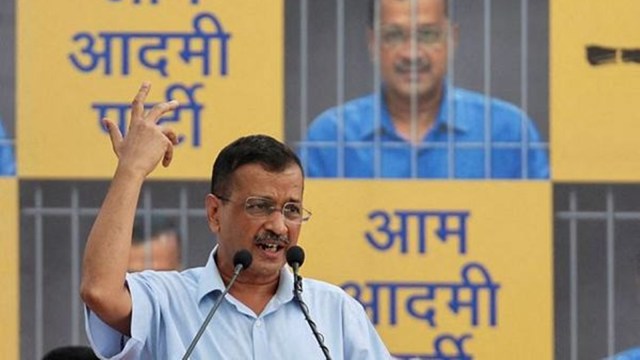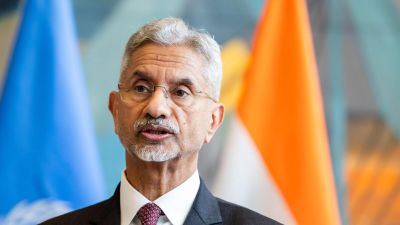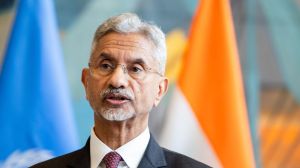Excise policy case: Delhi High Court stays trial court order granting bail to Arvind Kejriwal
The Delhi High Court said that the trial court while passing its order did not appropriately appreciate the material/documents submitted on record.
 Kejriwal was arrested on March 21 in connection with the excise policy case. (PTI Photo)
Kejriwal was arrested on March 21 in connection with the excise policy case. (PTI Photo)The Delhi High Court on Tuesday stayed a trial court order granting bail to Chief Minister Arvind Kejriwal in the excise policy case being probed by the Enforcement Directorate (ED). A single-judge bench of Justice Sudhir Kumar Jain passed the order while allowing ED’s application seeking a stay of the trial court’s June 20 order granting bail to Arvind Kejriwal.
In the 34-page order, Justice Jain said, “The Vacation Judge while passing the Impugned Order (bail order) did not appropriately appreciate the material/documents submitted on record and pleas taken by ED and the averments/grounds as raised in the petition under Section 439(2) of the Code require serious consideration while dealing with the said petition. Accordingly, the present application is allowed and the operation of the Impugned Order is stayed.”
However, Justice Jain made it clear that nothing in the order should be taken as an opinion or observation on the merits of the main petition moved by ED challenging the trial court order. The main matter is listed on July 10.
The High Court took note of paragraph 16 of the trial court order which observes that “it is not possible to go through thousands of pages of documents filed by the respective parties but it is the duty of the court to work upon the matter whichever comes for consideration and passed the order in accordance with law”. The court also noted that para 36 of the trial court order observed that most of the relevant arguments and contentions raised on behalf of the parties are being dealt with by the trial court.
“It is not understandable that on one hand, the Vacation Judge has expressed her inability to go through entire documents stated to have been running into thousands of pages at the time of passing the Impugned Order and on the other hand, how in para no. 36 the Vacation Judge has mentioned that relevant arguments and contentions raised on behalf of the parties are dealt with,” said Justice Jain.
“The perusal of the Impugned Order is reflecting that the Vacation Judge has passed the Impugned Order without going through and appreciating the entire material brought on record by the rival parties which reflects perversity in the Impugned Order. There is a factual force in the arguments advanced by Sh S V Raju (appearing for the ED) that the Vacation Judge has not passed the Impugned Order after due consideration of (the) entire material on record,” added Justice Jain.
The observation, the High Court said, made by the Vacation Judge in the bail order was “uncalled for, unwarranted and out of context” and the trial court should “refrain from making such observations in the Impugned Order”.
The court added that the vacation judge was required to consider “every important and relevant document” at the time of passing the bail order. The bail order in paras 1 to 6 has mentioned the contentions of both parties and the arguments advanced by their respective counsels but a perusal of the bail order reflects “that the Vacation Judge did not discuss and considered said contentions and the arguments in impugned order”, added the high court.
The Delhi HC took note of an argument advanced by Senior Advocate Abhishek Manu Singhvi, appearing for Arvind Kejriwal, that the grant of bail and cancellation of bail are two different aspects wherein he had also cited various judgments.
“It is accepted proposition of law that the rejection of the bail in a non-bailable case at the initial stage and the cancellation of bail so granted have to be considered and dealt with on different basis and very cogent and overwhelming circumstances are necessary for an order directing the cancellation of bail already granted…However, the issue of whether the present main petition under Section 439(2) of the Code is maintainable or not maintainable has to be considered appropriately by the concerned Roster Bench while dealing with the main petition,” the HC said.
To Additional Solicitor General Raju’s argument that the vacation judge had not given an appropriate opportunity to ED to oppose Kejriwal’s bail plea as per the mandate of Section 45 of the PMLA, the HC said, “Every court is under an obligation to give sufficient and appropriate opportunity to represent their respective case before the court. ED ought to have given adequate opportunity to advance arguments on the bail application by the Vacation Judge…”.
The HC referred to the Supreme Court’s 2022 decision in Vijay Madan Lal Choudhary vs Union of India where the top court observed that at the stage of consideration of application for grant of bail, it is expected to consider the question from the angle as to whether the accused was possessed of the requisite mens rea and the court is not required to record a positive finding that the accused had not committed an offence under the Act.
“It was further observed that the Court ought to maintain a delegate balance between a judgment of acquittal and conviction and order granting bail much before commencement of trial… However, the Vacation Judge in the Impugned Order has not discussed the requirement of Section 45 of PMLA while passing the Impugned Order. The trial court should have at least recorded its satisfaction about the fulfillment of twin conditions of section 45 of PMLA before passing the impugned order,” Justice Jain said.
With respect to the observation in the bail order that there was “mala fide” on the central agency’s part, the HC referred to the April 9 order of a coordinate single judge bench of the HC which had while upholding the CM’s arrest by ED observed the “absence of any mala fide intention” on the agency’s part. The coordinate bench in its April 9 further observed that the “Court has to examine the arrest and remand” of Kejriwal “irrespective of the timing of the elections”.
Justice Jain said it cannot lose sight of the fact that the Supreme Court while hearing Kejriwal’s Special Leave Petition against the April 9 High Court order had granted leave but the apex court did not stay the operation of that day’s decision. “The Vacation Judge after following the judicial discipline should not have observed in para no. 27 of the Impugned Order that there was mala fide on the part of ED, particularly in light of the observation made in the judgment dated 09.04.2024 as referred herein above,” said Justice Jain.
With respect to ED’s allegation on Kejriwal’s vicarious liability as per Section 70 of PMLA, the HC observed, “The perusal of written note submitted by ED before the Special Judge/Vacation Judge reflects that the issue regarding the role of respondent for vicarious liability was taken by ED…but the said issue did not find any place in the Impugned Order”.
The HC noted Singhvi’s argument on the “personal liberty of a person” being supreme and that Kejriwal did not misuse the interim bail granted for about 20 days to him by the Supreme Court on May 10. The HC also took note of Singhvi’s argument that if ED’s stay application is allowed it shall be tantamount to cancellation of bail and further if the agency’s main petition is dismissed, Kejriwal can be again sent back to judicial custody.
On these arguments, the HC said, “The personal liberty as guaranteed under Article 21 of the Constitution cannot be deprived to a citizen except with the procedure established by law”.
The court noted that Kejriwal was arrested by ED on March 21 for “further investigation” when he “did not join investigation despite issuance of 9 summons”.
Kejriwal then filed a writ petition to declare his arrest as illegal, however a single judge bench of the High Court on April 9 dismissed his plea. Against this, the HC noted, Kejriwal moved the SC where leave was granted and judgment has already been reserved after the conclusion of arguments on May 17.
However, Justice Jain observed that since the operation of the High Court’s April 9 order has not been stayed by the Supreme Court and so “at this stage, it cannot be said that arrest and remand of the respondent (Kejriwal) was not in accordance with law and personal liberty of the respondent was curtailed without following the procedure established by law”.
Noting that while there was no allegation of misuse of interim bail by Kejriwal, Justice Jain said the court cannot lose sight of the fact that interim bail was not granted merit but in the background of the Lok Sabha elections 2024.
“There is also no force in argument advanced by Dr Singhvi that if the present petition under section 439 (2) of the Code is dismissed then the respondent can be again remanded to judicial custody, particularly in view of the fact that Impugned Order passed by the Vacation Judge is under serious challenge and grounds of challenge as raised by ED requires consideration of the concerned court,” the HC said.
On Kejriwal’s argument that no recovery of proceeds of crime was traced to him, the HC said, “…A perusal of the note submitted by ED before the Special Judge/Vacation Judge reflected that the said plea was encountered by ED but not sufficiently and adequately dealt with by the Vacation Judge in the Impugned Order”.
On Raju’s argument that the June 20 order is “perverse”, the HC said it “requires further consideration”. On Raju’s argument that the bail order was passed based on “irrelevant consideration”, the HC said these points are required to be considered by the roster bench when it considers the main petition.
On arguments advanced by Kejriwal’s counsels that his arrest is bad and the April 9 judgment of the High Court upholding his arrest by ED has also not attained finality, the HC said the same is “required to be dealt with at the time of consideration” of the agency’s main petition.
On June 20, Special Judge Niyay Bindu of Rouse Avenue Court granted bail to Kejriwal and declined ED’s plea to keep the bail order in abeyance for 48 hours. This prompted the central agency to approach the High Court on June 21. While reserving its verdict in ED’s stay plea, the HC heard the arguments and reserved the order. “Till the pronouncement of the order on the stay application, the operation of the impugned order shall remain stayed,” the court said.
The Delhi High Court also permitted both parties to file short, written submissions by June 24.







